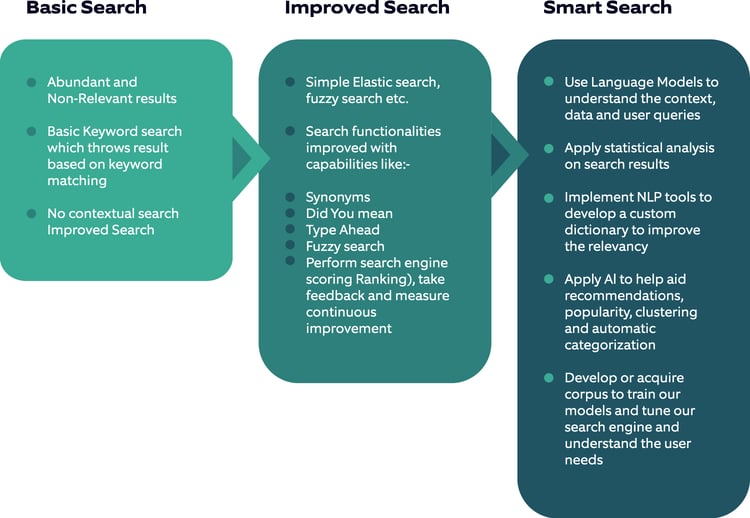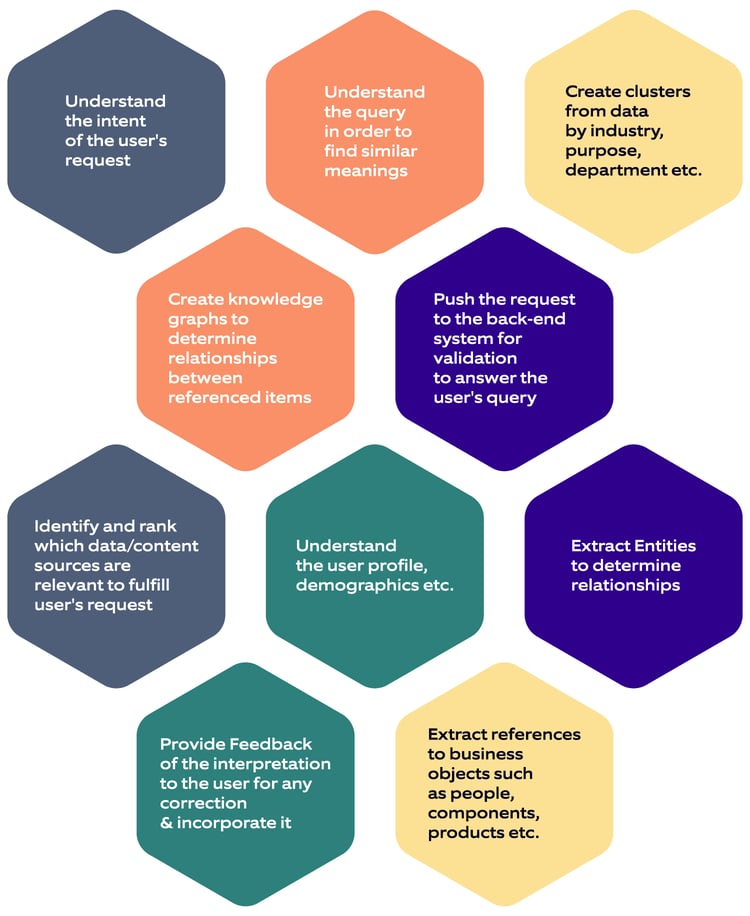Two things are considered certain, death and taxes. Today, one might as well add 'enterprise search' to that. As data keeps getting added to enterprise applications (mobile, desktop, or both), it becomes a nightmare to search for a particular item. That's precisely why intelligent search is critical for any enterprise.
Traditional search engines don't help anymore because they lack the sophistication to get into the depth needed to be efficient.
Thanks to Artificial Intelligence (AI) capabilities like Natural Language Processing (NLP), Machine Learning (ML), Knowledge graphs and OCR, 'search' has become more intelligent. For example, the apps on your smartphone have an intelligent search engine that powers each app to filter the results to instantly display what you are looking for.
This article will discuss the essential factors for a smarter search and its application areas.
Two important factors to make your search smarter
1. Understanding the user's context
AI models can understand their users better through relevant information like:
- The search queries of their users
- the content their users' visit
- the images they browse
- the videos they watch
- their comments or real-time chats
- their logged support tickets
Feeding this user behavioral data into ML algorithms helps search engines understand user intent and content relevancy. Additionally, user profile data such as location, demographic information, work responsibilities, and published content can also enhance the AI/ML model.
As more data is fed into the models, the search engine improves. For example, a financial security expert user types a search query like "Impact of blockchain technologies." The user will expect results such as how blockchain can enhance financial data security. On the other hand, a healthcare provider might want to know how blockchain can help secure electronic health records.
As we have a huge amount of data, search engines use unsupervised learning to improve their search results. An intelligent search engine would provide personalized results to each user based on its understanding of the user type and intent. - this is where intelligent search's homework on the user's background comes in handy.
Better data quality helps the AI engine to understand the intent of a group of users. This trains the AI/ML models to enhance the search engine results.
2. Understanding the content
All organizations have massive amounts of internal data, such as text documents, images, audios, PDFs, videos, emails, etc. Unlike internet content that is specifically labelled/tagged by humans to increase searchability, enterprise content lacks the standard labelling and classification. AI techniques like NLP and ML can automate the extraction, tagging, and classification of concepts and entities on the enterprise data.
For example, NLP can extract features from text details using Named Entity Recognition (NER), PDFs, etc., like assets, products, people, companies, and domains. Once this data is fed into the ML algorithms, the system can learn the language specific to a company or domain like its acronyms, processes, etc.
Different enterprise search stages and how to transform from one stage to the other

How to use AI technologies when processing content based on user search requests:

Libraries and tools that support NLP and AI/ML technologies and are used for building search engines
Based on the need, enterprises can select appropriate approaches and toolsets for their specific use cases, such as:
- Elastic Search
- Azure Search
- Amazon Kendra
- IBM Watson Discovery
- Solr
- Lucidworks
- Sinequa
- Google Cloud Search
Where to apply intelligent search
Here are some areas where we can apply intelligent search:
1. Knowledge management
- Type of content: Documentation, training material, sales, marketing research work, proposals, sales pitches, RFPs, RFIs, contracts, and legal documents.
- Search queries should enable users to quickly and accurately find whatever they are looking for. Beyond serving relevant documents, these queries can also leverage automated information extraction to deliver precise answers to user queries, problem troubleshooting, etc.
2. Business analytics/insights
- Type of content: Reports, charts, graphs, KPIs, comparisons (quarter by quarter or year by year)
- Search queries should allow the user to understand an organization's performance and enable extracting subset and filtered views based on any person, time, location, product, etc.
3. Healthcare
- Type of content: Prescriptions, EMRs, recommendations, whitepapers, etc.
- Search queries should enable healthcare workers or users to:
- quickly scan medical records, extract prescriptions, and recommendations from historical data, videos, training materials based on diagnosing a specific disease
- unlock unstructured data in databases by mapping out essential concepts and values, allowing the doctor to use this information for analytics and decision-making.
Benefit from Nagarro's expertise
Nagarro's Big Data - AI/ML practice has been helping various clients in their search capability transformation journeys. Our team has implemented a much-appreciated intelligent search feature in a facility knowledge management application.
- This feature considers the user's context and predicts intent to filter out non-relevant search items from an elastic search.
- Previously, the app users had to spend a lot of time searching for relevant content. Nagarro's solution used deep learning algorithms, NLP, image recognition, etc. to save a substantial chunk of the time spent in search.
- This model is trained on live data and keeps improving over time (with more data). Since deep learning techniques may need time to evolve and get more accurate, users can always fall back to default elastic search results.
Here are some services/techniques that intelligent search uses:
- AWS Lex – To predict user intent from a search query
- NLP – To classify text and extract entities
- Named entity recognition – To extract asset type., location, etc. from a search query
- Q&A Model – To find relevant answers for question type search query
- Elastic Search – To index all the data for efficient search
- Wake Word Detection – To awake the search functionality handsfree (Voice-based search)
In a nutshell
To enable efficient and accurate search results, enterprises must transform their search mechanism from a basic search to an intelligent, AI/ML-based one. Powered with NLP, ML, Image Recognition (OCR, Real-time Object Detection, etc.), an intelligent search engine understands the user's context and intent. This requires training on quality datasets, statistical analysis, and patience to fine-tune the model over time.
If some enterprises do not have specific or intent-based requirements, they can opt for an improved search model. This model might not be as accurate as an intelligent search but can still filter the results based on elastic search, fuzzy search, etc. Per the priorities and vision of any organization, it can move from basic search to intelligent search. This can help consumers save time and get valuable insights to improve their day-to-day functioning.
Do you want to implement an intelligent search feature in your organization? We can help! Explore our capabilities and connect with our experts today!





